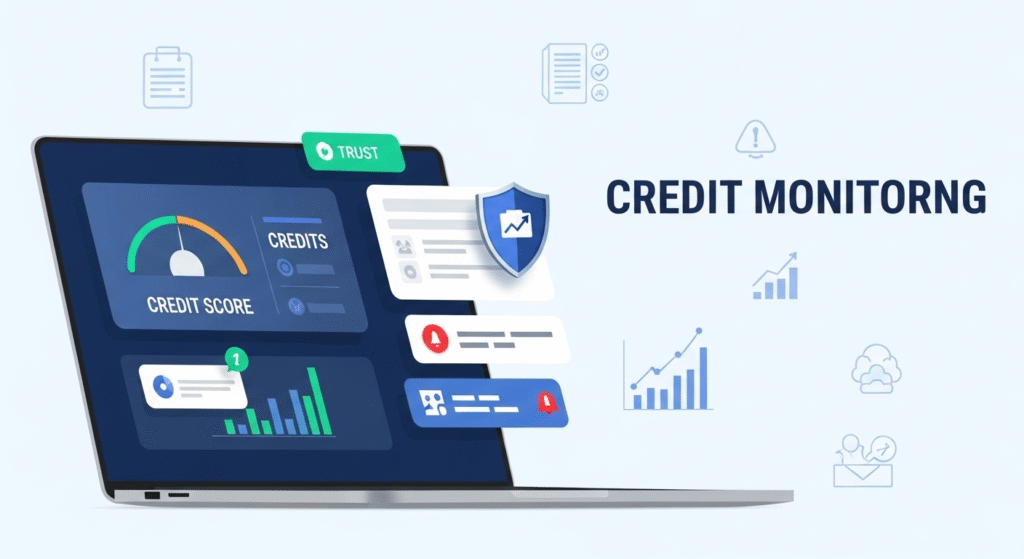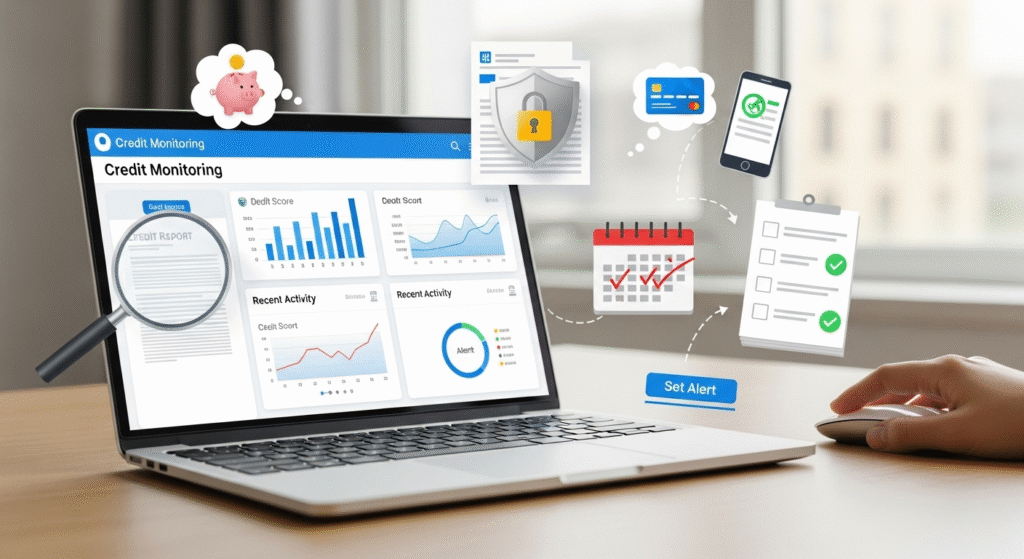
Credit Monitoring Tools are essential for anyone who wants to take control of their financial health. They allow you to track your credit score, monitor changes, and quickly spot unusual activity that could indicate errors or identity theft. By keeping a close eye on factors like payment history, credit utilization, and new inquiries, you can make smarter financial decisions and avoid potential problems before they escalate.
In this guide, we will explore how Credit Monitoring Tools can help you improve your credit score, stay informed about your borrowing potential, and develop better financial habits. You’ll also learn practical tips on selecting the right tools and using them effectively for long-term financial stability.
Why Credit Monitoring Matters
Credit Monitoring Tools are essential for anyone looking to maintain strong financial health. One of the primary reasons they matter is early detection of fraud or suspicious activity. With identity theft and credit card fraud becoming increasingly common, these tools alert users when there are unusual changes in their credit report. By catching potential issues early, you can take immediate action and prevent long-term damage to your credit score.
Another reason Credit Monitoring Tools are important is understanding credit score changes. Many people are unaware of the factors affecting their scores, such as payment history, credit utilization, and recent inquiries. These tools provide insights into what impacts your score and help you make informed decisions to maintain or improve it. When you can see changes in real-time, you can adjust spending habits, pay down balances, or dispute errors quickly.
Key Features to Look for in a Credit Monitoring Tool

When choosing Credit Monitoring Tools, several key features are crucial for effective tracking. First, real-time alerts are essential. These alerts notify you immediately when there are changes to your credit report, such as new accounts, late payments, or inquiries. Quick notifications help you respond promptly to potential issues, reducing the risk of financial damage.
Another important feature is access to credit reports from all three major bureaus—Experian, Equifax, and TransUnion. Not all monitoring services provide full access, so ensure the tool covers comprehensive reporting. Credit score simulators and improvement suggestions are also valuable. These tools allow users to see how certain actions, like paying off debt or reducing credit utilization, can positively affect their score.
Identity theft protection and recovery services add another layer of security. These features provide guidance and assistance if your personal information is compromised. Finally, a user-friendly dashboard and mobile access enhance usability. Tools that are easy to navigate encourage consistent use and make monitoring less stressful.
Best Credit Monitoring Tools (2025 Edition)

Credit Monitoring Tools are essential for anyone looking to maintain strong financial health and stay on top of their credit score. In 2025, there are several top-rated tools designed to meet different needs, from beginner-friendly options to advanced platforms for serious credit tracking. Using Credit Monitoring Tools helps users detect fraud early, understand credit changes, and make informed financial decisions. In this guide, we’ll explore some of the best Credit Monitoring Tools available today and what makes them stand out.
One of the most popular options is Experian CreditWorks. Experian provides access to credit reports from all three major bureaus: Experian, Equifax, and TransUnion. This is important because not all monitoring services offer full coverage. Credit monitoring tools, such as Experian CreditWorks, offer real-time alerts for any changes in your credit report, ensuring you are immediately notified of suspicious activity. Additionally, Experian includes identity theft protection and recovery services, giving users peace of mind. Its user-friendly interface makes it suitable for both beginners and advanced users.
Credit Karma is another widely used Credit Monitoring Tool. It provides free credit monitoring services, offering insights into your credit score and personalized recommendations to improve it. Credit Karma also has credit simulators, allowing users to see how actions such as paying off debt or opening new accounts affect their score. The tool is excellent for beginners because it simplifies complex credit data into easy-to-understand information. Using Credit Monitoring Tools like Credit Karma helps users stay proactive about credit health and make smarter financial decisions.
For users seeking in-depth credit analysis, myFICO is a top choice. This tool focuses on FICO scores, which are often used by lenders to make credit decisions. Credit Monitoring Tools like myFICO provide detailed reports, historical tracking, and alerts for changes in your credit. This is useful for anyone planning major financial decisions, such as buying a home or applying for loans. myFICO also offers insights into key factors affecting your score, making it easier to develop strategies to improve it.
IdentityForce is a robust Credit Monitoring Tool for users concerned about identity theft. It provides comprehensive monitoring, alerts for suspicious activity, and recovery services if your personal information is compromised. IdentityForce also includes access to credit reports and scores, helping users manage credit proactively.
Finally, Credit Sesame is another popular Credit Monitoring Tool that combines free monitoring with actionable financial advice. It provides credit scores, alerts, and tips for improving your credit. Credit Sesame also highlights loans, credit cards, and offers tailored to your profile, making it a complete platform for managing your credit.
How to Use Credit Monitoring Tools Effectively?

To get the most from Credit Monitoring Tools, begin by setting up alerts and reviewing reports regularly. Monthly checks allow you to stay aware of any changes, detect errors, and monitor trends in your credit score. Consistent use prevents surprises and helps maintain financial health.
Analyzing score factors like payment history, credit utilization, and new inquiries is crucial. Credit Monitoring Tools often break down these factors, showing which areas need improvement. For example, if utilization is high, focus on paying down balances to improve your score.
Take immediate action on errors or negative changes. Dispute incorrect entries, contact lenders if needed, and adjust spending habits to avoid future issues. Using Credit Monitoring Tools effectively means being proactive rather than reactive.
Conclusion
Credit Monitoring Tools are essential for anyone aiming to maintain a healthy credit score and protect their financial well-being. By regularly using Credit Monitoring Tools, you can detect fraud early, understand what affects your score, and take timely actions to improve it. These tools simplify complex credit information, provide real-time alerts, and offer valuable insights for smart financial planning. Whether you are a beginner or an advanced user, Credit Monitoring Tools help you stay proactive, make informed decisions, and achieve long-term financial stability. Consistent use of these tools empowers you to manage credit responsibly and secure a stronger financial future.
FAQs
What are Credit Monitoring Tools and why should I use them?
Credit Monitoring Tools are services that track your credit reports and scores regularly. They alert you to changes, such as new accounts, late payments, or suspicious activity. Using these tools helps detect fraud early, understand your credit health, and make informed financial decisions. They are essential for maintaining a good credit score, avoiding identity theft, and ensuring long-term financial stability.
How often should I check my credit using Credit Monitoring Tools?
You should review your credit reports at least once a month using Credit Monitoring Tools. Frequent checks help you spot errors, monitor score changes, and detect unauthorized activity promptly. Some tools provide real-time alerts, which means you are notified immediately if anything unusual occurs. Regular monitoring allows you to make proactive decisions to improve your credit and maintain a strong financial profile.
Can Credit Monitoring Tools improve my credit score?
Credit Monitoring Tools themselves do not directly improve your score, but they provide insights to help you make smarter financial choices. By tracking payment history, credit utilization, and new accounts, you can address issues that affect your score. Using Credit Monitoring Tools helps you stay consistent with good habits, catch errors early, and plan strategies that ultimately lead to a higher credit score.
Are Credit Monitoring Tools safe to use?
Yes, reputable Credit Monitoring Tools are secure and use encryption to protect your personal and financial information. They monitor sensitive data, provide alerts for suspicious activity, and often include identity theft protection. Choosing trusted services ensures your credit information is safe while giving you the ability to track and manage your credit effectively.
Can Credit Tools alert me about identity theft?
Yes, many Credit Monitoring Tools include identity theft alerts. They notify you if suspicious activity occurs, such as new accounts opened in your name or unusual credit inquiries. Using Credit Monitoring Tools helps you react quickly, report fraud, and protect your financial information. Early detection through these tools reduces potential damage and supports long-term financial safety.
